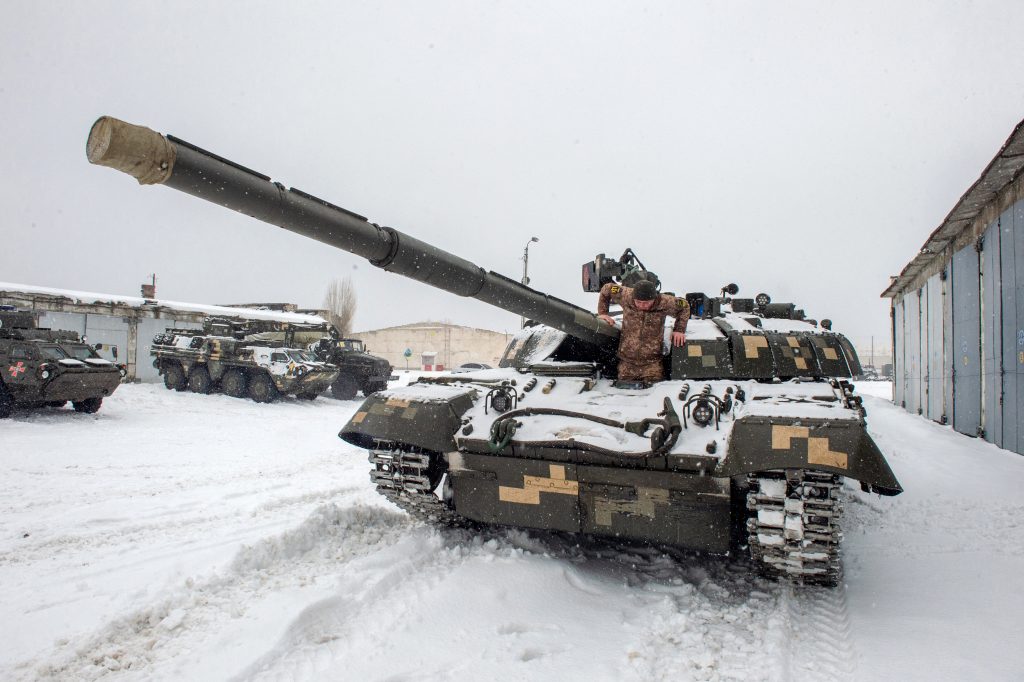Russian president Putin announced on Tuesday a partial troop withdrawal from the border with Ukraine as a possible sign that he wants to climb down from the tree but he is still keeping his cards close to his chest.
After meeting German Chancellor Olaf Scholz of Germany, who earlier had said that that “there was no sensible reasons” for the military build-up at the border, Putin said that Russia would keep pushing for its central demands of a rollback of the NATO presence in Eastern Europe and a guarantee that Ukraine never join the alliance.
“We are also ready to continue on the negotiating track, but all these questions, as has been said before, must be viewed comprehensively,” he said.
NATO’s expansion to the eastern European countries that during the cold war belonged to the Soviet sphere of influence has always been controversial. For Russia, the deployment of NATO troops in these countries is seen as security threat and under Putin’s regime it has also become part of a historical narrative linked to restoring Russia’s glory as a world power.
Ukraine was vaguely promised NATO membership at a NATO summit in Bucharest in 2008 but the actual implementation has been kept on hold since then and some NATO members regret the promise. An amendment in Ukraine’s constitution states NATO membership as an ultimate goal of the country but recent statements by the government might indicate that it is not its major strategic concern or a supreme value.
More important for Ukraine is to develop its ties with the EU and join the Union in the future after meeting the conditions as long as its independence and territorial integrity are guaranteed.
But EU membership might also be opposed by Russia. The refusal of a former pro-Russian president of Ukraine to sign an association and free trade agreement with the EU led to the Maidan revolution. It was followed by Russian support to pro-Russian separatists in Eastern Ukraine and its annexation of Crimea in 2014.
What is EU’s position on Ukraine joining NATO?
“It’s not for the EU to discuss membership of countries in other organisations or alliances,” Peter Stano, Lead Spokesperson for EU Foreign Affairs and Security Policy, told The Brussels Times. “But we are strongly supporting and insisting on respecting the right of sovereign countries to decide by themselves where they want to belong. There are international agreements guaranteeing the right of countries to choose their foreign policy and security arrangements.”
The build-up of Russian military force at the border with Ukraine, threatening to invade the country, has taken place in full view. The outside world is powerless to prevent an invasion which seems next to inevitable besides issuing statements and threatening Russia with unprecedented sanctions that do not seem to frighten the Russian president.
Does the EU plan any last-minute diplomatic initiatives and statements?
Peter Stano replied that no new statements are planned and referred to EU’s known position as it has been expressed in previous statements. The most recent one was last week (10 February) in a letter from High Representative Josep Borrell to Russia’s foreign minister Sergey Lavrov.
The letter, which is not public, is based on the “unanimous decision” by all 27 EU member states in response to Lavrov’s written message to each one of them on 28 January. Russia would have preferred to receive separate replies from them and did not expect a common EU response.
“The EU has a common foreign and security policy and our aim is to act united on all key issues of key common interest. This includes also coordinating replies to letters, as called for. It is up to EU member states to decide on these matters. Only those who are interested in dividing us, would question such a decision.”
In the letter, EU offers to “continue the dialogue with Russia on ways to strengthen the security of all”. Peter Stano added that EU “continues to call for de-escalation and is ready to address all Russian concerns in the dialogue using existing international platforms, such as the OSCE. For us the main priority is to continue to look for solutions on the diplomatic track.”
However, should Russia make the diplomatic efforts fail and decide to attack Ukraine, EU will react in a robust way with massive sanctions, which are coordinated with its international partners. “There is no reason to attack Ukraine. The military build-up by Russia at the borders of Ukraine is unprovoked. Ukraine nor the EU or NATO do not pose any threat to Russia.”
In this critical moment, Ukraine is eager for every sign of solidarity and president Zelensky has suggested that a visit by US president Biden would be helpful. This is unlikely to happen. Instead, US and other countries have evacuated its diplomatic staff and their families.
European Commission President von der Leyen cancelled her participation in a debate in the European Parliament on Wednesday but whether she plans to travel to Kyiv is unknown. High Representative Borrell was the first EU representative to visit Ukraine since the crisis erupted last December. He was in Kyiv and eastern Ukraine also shortly after New Year’s Day and is in regular contact with the Ukrainian Foreign Minister, Stano added.
M. Apelblat
The Brussels Times

